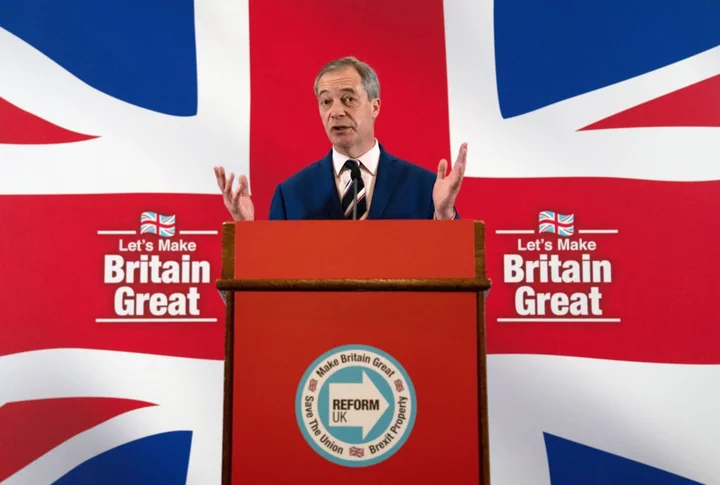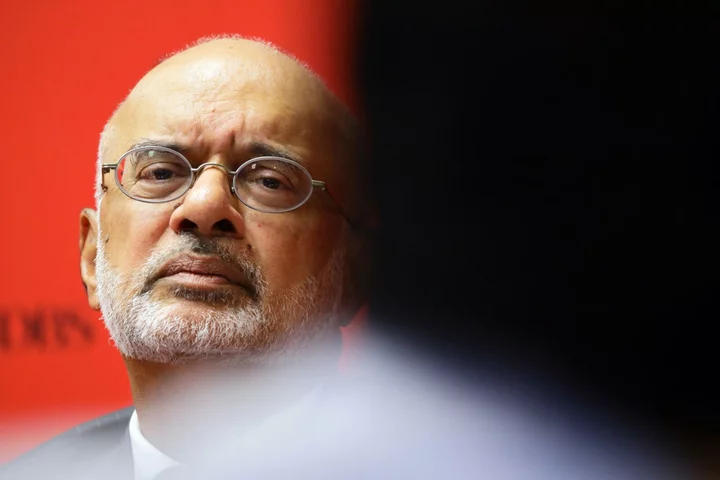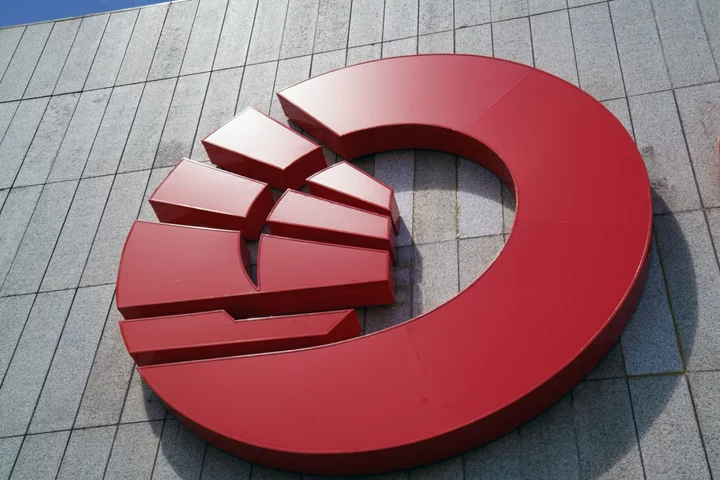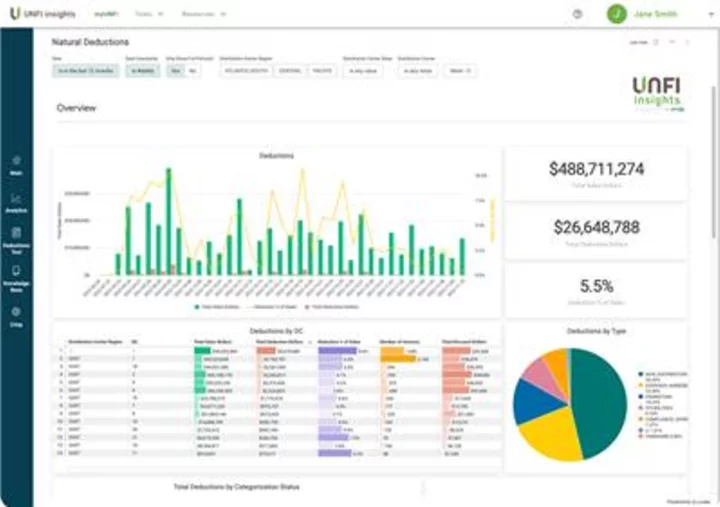Nigel Farage has said he felt embarrassed when he was told that Coutts — a UK bank for the wealthy — was planning to close his account. But he fought back, with his campaign drawing support from the prime minister and Elon Musk.
According to Farage, one of the most prominent politicians behind the UK’s 2016 decision to leave the European Union, what’s at stake is freedom of speech and the principles of democracy. He claims that Coutts dropped him because of his personal views and that an unchallenged decision would mean the UK is no different than a “Chinese Communist-style social credit system.”
Coutts’ move is also a breach of the fundamental contract in banking, which dictates that accounts are the universal service obligation of a sector that enjoys enormous power, according Farage and many of his supporters.
Prime Minister Rishi Sunak described Coutts’ decision on Twitter as “wrong,” with the social media platform’s owner Elon Musk weighing in with “Hear! Hear!”
Others say the situation is not so simple, as the decision by Coutts didn’t only lean on Farage’s views, but also the state of his finances.
CEO Entangled
The row has drawn in Coutts’ parent Natwest Group Plc, in which taxpayers hold a 39% stake after a 2008 bailout, and its Chief Executive Officer Alison Rose.
Rose has apologized for the assessment by Coutts that Farage is perceived to be “xenophobic and racist” and a “grifter,” according to comments that Farage accessed through an information request for his personal data. She also promised a review of the bank’s processes for exiting clients.
Farage isn’t prepared to let the matter go. He has submitted a second request to NatWest over its potential leak of information to the BBC, which reported on July 4 that his account was closed because his funds fell below the required threshold.
NatWest did not comment, but has said in a statement alongside Rose’s apology that “decisions to close an account are not taken lightly and involve a number of factors including commercial viability, reputational considerations, and legal and regulatory requirements.”
If Rose was responsible for divulging information about Farage’s finances to the media she will have to resign, former Prime Minister Boris Johnson wrote in the Daily Mail on Friday.
Regulators have questions of their own. Financial Conduct Authority CEO Nikhil Rathi told MPs this week that the watchdog was in touch with the bank.
On the point about a potential leak, Rathi said: “We would be concerned if there has been a breach of data protection rules.” That matter is for the Information Commissioner’s Office, Rathi added. An ICO spokesperson said anyone with complaints should raise the matter with the relevant organization first, then come to the body.
Conservative lawmaker David Davis told parliament that NatWest had “lied” and that the saga should “jeopardize its banking license.”
Other customers are mobilizing too, with a Facebook group of about 10,000 sharing information about how to lodge their own information access requests to NatWest about account closures.
Banking Guarantees
The matter does not just affect NatWest.
British providers of mainstream current accounts aren’t allowed to remove customers’ basic banking services and must not discriminate on the basis of characteristics such as religion on race, according to law. They also have a regulatory duty to treat customers fairly.
The Treasury said this week firms must give customers 90 days notice to shut accounts and to spell out the reasons.
“Banks occupy a privileged place in society, and it is right that we fairly balance the rights of banks to act in their commercial interest, with the right for everyone to express themselves freely,” said City Minister Andrew Griffith.
The government is also planning changes to the Politically Exposed Persons regime, which has been criticized for having overly onerous rules for politicians and other prominent individuals and their families over their financial arrangements.
Coutts classified Farage as a PEP, albeit one whose designation was expected to be lowered or dropped as he has stepped away from frontline politics.
Philip Hampton, a former chairman of NatWest when the group was still known as Royal Bank of Scotland, said banks normally close accounts over loan defaults or fraud. But there can also be a breakdown of trust between the parties.
“Clients who make deliberate false statements, for example, can rapidly lose trust and if trust is lost the relationship often ends,” he said. “I don’t think it’s the role of government to oblige banks to take on, or keep on, customers that the bank would prefer not to have.”
Farage said he unsuccessfully tried to open an account at 10 other banks when he was told by Coutts to leave, although he didn’t disclose the lenders’ names or whether they were private banks.
Still, some wonder why Farage’s case has drawn so much attention.
“Over one million people do not have bank accounts,” said Charles Randell, former chairman of the Financial Conduct Authority, the industry watchdog. “Hundreds of thousands of people go without basic provisions like contents insurance and millions of households are struggling to pay their bills.”
Societal Issues
While there are sector-wide issues, some believe NatWest faces specific challenges over its treatment of Farage.
Anthony Watson, chief executive of start-up Bank of London, said the Coutts dossier, as reported in the media, contained subjective statements.
“As a gay man I can tell you candidly Nigel Farage’s views don’t align with mine on all levels, but in a democracy citizens are entitled to differing views, no matter how odious one might find them,” Watson said.
NatWest’s Rose — the first woman to be CEO of a big UK bank — has taken a vocal stance on a range of issues from opportunities for women and girls to discrimination and climate finance. Last month, she attended an initiative of King Charles about sustainability in space.
She is not alone in widening her institution’s scope into social issues.
In many areas, regulators and investors expect it. The Bank of England has analyzed banks over their exposure to climate change while the FCA wants financial institutions to promote diversity and inclusion to improve their own performance and reduce risk.
But tackling wider issues has led to a backlash from some sectors in the US and the UK. GB News, a TV channel created in 2021 on which Farage hosts a regular show, features segments attacking Britain’s own “woke corporations.” with recent targets including NatWest, Innocent Drinks and home improvement retailer Wickes.
Farage’s Endgame
NatWest has repeatedly said it cannot comment on Farage because of client confidentiality.
Asked by Bloomberg if he would release the bank from the confidentiality requirement so it could give a full account of his removal, Farage declined. He also said he wouldn’t take his case to the Financial Ombudsman Service.
Farage could potentially bring a lawsuit against Coutts, arguing that he was facing discrimination based on philosophical beliefs, which are protected under the Equality Act, according to Sharokh Koussari, a partner at law firm Axiom DWFM.
Coutts would need to prove that its action was not discriminatory, for example by showing that they closed the account for financial reasons, Koussari said.
Meanwhile, Farage has his regular GB News show to attend to. He drew about 120,000 viewers each night this week compared to his usual average of around 80,000, a spokesman for GB News told Bloomberg, citing Broadcasters’ Audience Research Board figures.
“On YouTube, we have amassed over 3 million views on our coverage of the Coutts story since Nigel has had his account closed three weeks ago. More than 5% of this audience is from the US,” the spokesperson added.
As for NatWest, some believe there may have to be resignations. Such matters would be overseen by Howard Davies, NatWest’s chairman who himself is due to stand down next year. NatWest would not comment on whether it was considering executive departures or reductions in bonuses.
--With assistance from Aisha S Gani, Daniel Zuidijk, Thomas Seal and Andrew Silke.
Author: Katherine Griffiths, William Shaw and Harry Wilson









